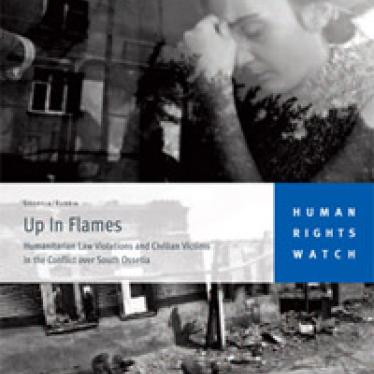(New York) - The rights of ethnic Georgian returnees to Abkhazia are hostage to nearly two decades of political conflict, Human Rights Watch said in a report released today. About 47,000 of those displaced by the fighting in the early 1990s as Abkhazia tried to separate from Georgia have returned to Gali, the southernmost district of Abkhazia. But they face barriers to civil and political rights, driving some to leave again and creating serious obstacles for large-scale, sustainable returns.
The 71-page report, "Living in Limbo: The Rights of Ethnic Georgian Returnees to the Gali District of Abkhazia," documents the arbitrary interference by Abkhazia's de facto authorities with returnees' rights to freedom of movement, education, and other political and economic rights. Although Abkhazia is not recognized as an independent state under international law, the authorities there nevertheless have obligations under international law to respect and protect rights and freedoms, Human Rights Watch said. They should ensure freedom of movement across the administrative boundary that separates Abkhazia from uncontested areas of Georgia and should end discrimination, in particular with access to identity documents and education, Human Rights Watch said.
"Without prejudice to Abkhazia's status, the authorities in Abkhazia have duties when it comes to protecting rights," said Rachel Denber, deputy Europe and Central Asia director at Human Rights Watch. "The Abkhaz authorities need to recognize and protect the rights of everyone in Abkhazia, including ethnic Georgians in Gali."
The report is based on interviews with more than 100 Gali residents conducted on both sides of the administrative boundary line, as well as Abkhaz officials and representatives of international governmental and nongovernmental organizations working in Abkhazia.
Armed conflict broke out in Abkhazia between the Georgian military and breakaway Abkhaz forces in the summer of 1992. As a result, more than 200,000 people, the majority of them ethnic Georgians, were displaced from their homes in Abkhazia and most have not returned. A ceasefire agreed to in May 1994 largely held until the brief war in August 2008 between Georgia and Russia over South Ossetia, another breakaway region of Georgia.
Moscow subsequently recognized Abkhazia as a state and vetoed the extension of the United Nations Observer Mission in Georgia, the leading international agency mediating between the sides. Following the recognition, Russian border guard troops replaced the UN military observers on the Abkhaz side of the administrative boundary line.
For years following the ceasefire, thousands of ethnic Georgians who returned to Gali commuted daily across the ceasefire line or migrated seasonally to tend their fields and look after their property in Gali.
Since 2008, the authorities in Abkhazia have required all residents to obtain Abkhaz passports to exercise certain rights, including seeking public employment, voting and running for public office, getting a high school diploma, carrying out property transactions, or commuting freely across the administrative boundary line. However, for ethnic Georgian returnees, the process of obtaining a passport is often discriminatory and overly burdensome.
"By putting in place a system that requires people to get an Abkhaz passport to exercise rights that should be available to all residents without discrimination, the authorities are arbitrarily interfering with those rights," Denber said.
Furthermore, for returnees, particularly for those without passports, the procedure for getting a permit to cross the administrative boundary is onerous, Human Rights Watch said. As a result, many people cross unofficially, risking detention, fines, and imprisonment.
"The ability to cross back and forth across the administrative boundary line is particularly important because the daily social, economic, and family life of many people in Gali is on both sides of this line," Denber said.
Since 1995 the Abkhaz authorities have gradually introduced Russian as the main language of instruction, reducing the availability of education in Gali in the Georgian language, especially in upper Gali. This has created barriers to education, as the majority of school-age children in Gali district do not speak Russian. Some parents are moving their children to schools where the curriculum is still in Georgian or are leaving Gali altogether so that their children can attend school in uncontested areas of Georgia. Although 11 schools in lower Gali continue to teach in Georgian, whether that will remain the language of instruction in those schools is uncertain.
"Abkhazia is determined to institutionalize its sovereignty, but this should not come at the cost of the rights of ethnic Georgians," Denber said. "The authorities need to recognize and protect rights of all people in Abkhazia, including ethnic Georgians in Gali district."






